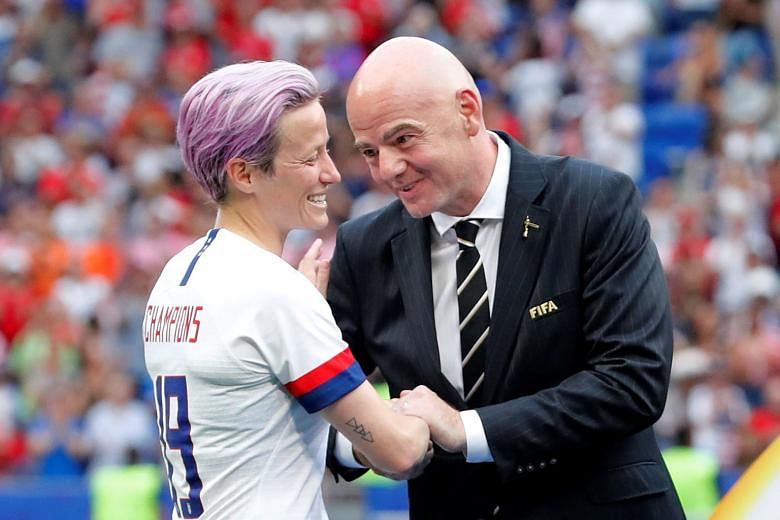LYON • For football fans in the United States, the juxtaposition was hard to ignore: the American women's team winning a record fourth World Cup in France, against their men's counterpart falling to bitter rivals Mexico hours later in a continental championship in Chicago.
The two results on Sunday were not a mere collision of games.
They also highlighted a contentious battle about pay equality featuring the men's and women's teams, the different media and financial ecosystems in which they compete, and the often unequal rewards for success for male and female athletes.
"Equal pay, equal pay!" chanted the US fans as the team began celebrating their Women's World Cup win over the Netherlands at the Parc Olympique Lyonnais.
The women's team contend they are paid less by the US Soccer Federation than the men - sometimes tens of thousands of dollars or more in a given year - and that the situation has persisted for years even as they have been more successful than the men.
On Friday, Fifa president Gianni Infantino announced that the prize money for the next Women's World Cup would be doubled to US$60 million (S$81.7 million).
But just 24 hours later a displeased United States co-captain Megan Rapinoe pointed out how the men would still receive much more in prize money - US$440 million - at their next World Cup in 2022.
Fifa has been justifiably proud of the large Women's World Cup attendances, with stadia over 75 per cent full throughout and a crowd of 57,900 watching the final in Lyon.
Even more impressive have been the record-smashing television ratings - the American audience for the game was 20 per cent higher than last year's men's final.
Also, the increasing numbers for countries such as England, France and Italy show the appetite for top women's games is increasing in Western Europe.
England's semi-final defeat by the US attracted the highest peak television audience in the UK so far this year, with 11.7 million tuning in at one point of the match to set a new record for women's football, according to the BBC.
That figure was also 50.8 per cent of the total audience at that time, beating the previous mark for a women's match (7.6 million for England's quarter-final win over Norway).
And with Europe's big clubs, such as Manchester United and Real Madrid, creating top-level teams to compete with the early adopters of the women's game like Arsenal and Lyon, the finances flowing into the game at club level are spiking.
Golden Boot winner Rapinoe also took aim at the governing body over the scheduling of two men's continental competition finals on the same day as the women's match and suggested that Fifa was not showing enough "respect" for the women's game.
"I think everyone is ready for this conversation and to move to the next step. I think we're done with 'are we worth it?'" she said.
"Should we have equal pay? Are the markets the same? Everyone's done with that... Let's get to the next point of what's next?
"We put on the most incredible show that you could ever ask for. We can't do anything more to impress more, to be better ambassadors... It's time to move that conversation forward to the next step."
She urged a focus to spread the game further internationally - a goal shared by New Zealander Sarai Bareman, Fifa's chief women's football officer.
Bareman is keen to see money from Fifa ring-fenced for women's development programmes in developing countries and areas where the sport has yet to flourish, and she has been forthright in pushing national federations to fully embrace the women's game.
REUTERS, BLOOMBERG, NYTIMES

